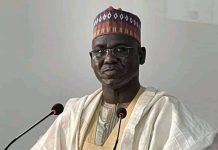By Jude Atupulazi
An outgoing Professor of Banking and Finance at Nnamdi Azikiwe University, Awka, Prof Steve Ibenta has told a success story of his academic journey, at the presentation of the maiden Ex-Augural Unizik Lecture.
Ibenta, who made History as the first Professor to present an Ex-Augural Lecture at Unizik, described his academic journey, as one that began with hope, nurtured by dedication, tested by challenges, and fulfilled only by the grace of God.
According to the Unizik Ex-Augural lecturer, who was born and brought up in a teachers’ quarter in a Catholic Mission Community at Ugwuntijiegbe, Akpu, where he also started his primary education, his formative years were influenced by the last batch of the white missionaries, notably one young Irish priest called Father Pascal.
‘He was so interested in me that I was actually living with them in the Father’s House.
‘I will never forget the dedication of teachers, the discipline and order and the maximum respect that teachers enjoyed in those good old days.
‘Every holiday period, we normally visited the family homestead at the inland town, Akpu, to do some farm work and to enjoy playing with other children in the village.
‘I enjoyed watching secondary school students strolling around town during this period, organizing students’ union meetings and other social activities.
‘The senior students were outstanding. I remember in particular, Ambrose Okeke and Ambrose Nwankwo, who resembled identical twins, tall and handsome in their impeccable, neatly ironed trousers and shirts, and always moving together.
‘What surprised me most was that they all spoke good English and that the boys were able to talk to the girls among them.
‘Robert Nwankwo was my godfather and already an undergraduate at the University of Nigeria, Nsukka.
 ‘So, he exuded so much poise and confidence whenever he visited us during the holidays.
‘So, he exuded so much poise and confidence whenever he visited us during the holidays.
‘I told my mother that I would like to be like those students and she hugged me.
‘I passed the entrance examinations to CKC Onitsha and CIC Enugu but my parents and my uncle insisted that I should proceed instead to St Peter’s Secondary School (SPSS), Achina, for economic reasons.
‘SPSS was another well groomed Catholic Mission School with a conducive environment for learning.
‘The usual triangular movement was from the dormitory, to the refectory, to the classroom/library/laboratory and back to the dormitory.
‘We had a long list of highly qualified teachers: Nigerians and Indians most of whom trained in Europe and America.
‘From there, I proceeded to the University of Nigeria, Nsukka, and finally to the University of Grenoble in France, in September, 1984.
‘The sojourn in France proved to be the most inspiring and most exciting episode in my life.
‘Their society was orderly, systematic and progressive, and everything worked with clock-like precision.
‘As a foreign student on French Government Scholarship, they would wait for you at the airport, take you to an already prepared residence and work round the clock to ensure that you were comfortable.
‘It was then that I discovered that the gap in technology and living standards between Nigeria and the developed world was immeasurable.
‘My co-students from other parts of Europe, Asia and America had their personal computers, but I had not seen one before in Nigeria. Every student who was qualified and interested, was admitted into one of the many Ivy League Universities in the country.
‘One of such Universities, the University of Paris, had nine campuses and one of the campuses that I attended for some programmes, the University of Paris Sorbonne, was more than Nnamdi Azikiwe University and the University of Nigeria put together with over 53,000 students.
‘Before long, our bloated ego as the giant of Africa vanished into thin air. Like most other African students in continental Europe, I was soon caught up in the web of the dream for a better African society which was in vogue in Europe at the time.
‘This, in part, informed my decision to return home immediately after my doctoral programme to contribute my quota to the development of my country,’ Prof Ibenta said, describing his success story as both personal and collective.
‘It is the story of a scholar’s pursuit of knowledge and the transformation of society through the view of money, finance, human and institutional development,’ the Ex-Augural lecturer said.
He expressed gratitude to the Ag Vice-Chancellor of the University, Prof Carol Arinze-Umobi, for approving his valedictory ceremony which attracted many dignitaries, including the Bishop of Awka Catholic Diocese, His Lordship, Most Rev Paulinus Ezeokafor.




